3 citations,
November 2021 in “Journal of Clinical Laboratory Analysis” hsa_circ_0001079 may help diagnose and treat hair loss.

Combining PRP with Tressfix Serum is more effective for hair regrowth in telogen effluvium than using either alone.
 January 2022 in “DOAJ (DOAJ: Directory of Open Access Journals)”
January 2022 in “DOAJ (DOAJ: Directory of Open Access Journals)” Argan oil-based nano carriers could potentially deliver caffeine to hair follicles to treat hair loss.
 13 citations,
June 2020 in “BMC genomics”
13 citations,
June 2020 in “BMC genomics” A specific microRNA, chi-miR-30b-5p, slows down the growth of hair-related cells by affecting the CaMKIIδ gene in cashmere goats.
8 citations,
July 2017 in “The journal of investigative dermatology/Journal of investigative dermatology” Certain microRNAs might help identify and understand Frontal Fibrosing Alopecia.
February 2014 in “Faculty Opinions – Post-Publication Peer Review of the Biomedical Literature” July 2021 in “Faculty Opinions – Post-Publication Peer Review of the Biomedical Literature”  June 2023 in “Faculty Opinions – Post-Publication Peer Review of the Biomedical Literature”
June 2023 in “Faculty Opinions – Post-Publication Peer Review of the Biomedical Literature” Bicalutamide mesotherapy improved hair density in women with hair loss and was well received.
 5 citations,
September 2021 in “Journal of The American Academy of Dermatology”
5 citations,
September 2021 in “Journal of The American Academy of Dermatology” Most men with Frontal fibrosing alopecia also lose facial hair and the condition may be linked to hormone levels and sunscreen use.
 February 2016 in “Faculty Opinions – Post-Publication Peer Review of the Biomedical Literature”
February 2016 in “Faculty Opinions – Post-Publication Peer Review of the Biomedical Literature” A hair test can accurately predict if a person with hair loss will respond to minoxidil treatment.
June 2020 in “Faculty Opinions – Post-Publication Peer Review of the Biomedical Literature”  22 citations,
January 2014 in “Indian Journal of Endocrinology and Metabolism”
22 citations,
January 2014 in “Indian Journal of Endocrinology and Metabolism” Family members of North Indian women with PCOS have a high rate of metabolic syndrome.
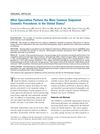 22 citations,
December 2007 in “Dermatologic Surgery”
22 citations,
December 2007 in “Dermatologic Surgery” Dermatologists performed the most outpatient cosmetic procedures in the U.S. from 1995 to 2003, especially on white women aged 40 to 59.
 4 citations,
January 2014 in “Indian Journal of Endocrinology and Metabolism”
4 citations,
January 2014 in “Indian Journal of Endocrinology and Metabolism” Indian women with PCOS may need different ultrasound criteria for diagnosis than current standards.
 September 2013 in “Science”
September 2013 in “Science” Certain astrocytes can protect the brain and improve recovery after a stroke, and a hair loss drug might reduce cancer spread.
2 citations,
November 2011 in “Pediatric dermatology”  September 2013 in “Science”
September 2013 in “Science” Human stem cells can aid stroke recovery, research experiences boost students' career aspirations, minoxidil may reduce cancer spread, a molecule can slow tumor growth, a protein affects water flow in cells, magnesium behaves differently at tiny scales, and a new method detects slow-moving objects.
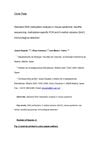 7 citations,
October 2013 in “Methods in molecular biology”
7 citations,
October 2013 in “Methods in molecular biology” These methods help understand DNA changes in mouse skin.
 10 citations,
January 2013 in “Clinical and developmental immunology/Clinical & developmental immunology”
10 citations,
January 2013 in “Clinical and developmental immunology/Clinical & developmental immunology” The document concludes that systemic autoimmune diseases are complex, incurable, and require ongoing treatment and research.
 November 2023 in “Current Dermatology Reports”
November 2023 in “Current Dermatology Reports” Oral minoxidil is effective for various hair loss types and may improve male sexual function, but aspirin can reduce its effectiveness.
 December 2023 in “Animal research and one health”
December 2023 in “Animal research and one health” Certain circular RNAs are crucial for wool growth and curvature in goats.
 February 2023 in “Journal of dermatology”
February 2023 in “Journal of dermatology” The first Japanese case of a genetic hair disorder caused by specific mutations in the LIPH gene was identified.
April 2019 in “Journal of Investigative Dermatology” Y27632 increases cell growth through EGFR signaling, not ROCK1/2.
 July 2024 in “Pharmaceutics”
July 2024 in “Pharmaceutics” The new hydrogel treatment promotes faster hair growth and better skin health for hair loss.
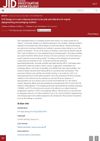 November 2022 in “Journal of Investigative Dermatology”
November 2022 in “Journal of Investigative Dermatology” A new molecule was found to be a safe and effective skin lightener and anti-aging product.
 12 citations,
February 2010 in “Journal of The American Academy of Dermatology”
12 citations,
February 2010 in “Journal of The American Academy of Dermatology” A cancer drug caused unusual hair growth on a 100-year-old man's scalp and eyelashes.
8 citations,
October 2021 in “Experimental cell research” Engineered vesicles from macrophages help hair growth in mice and humans.
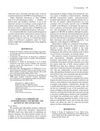 November 2011 in “Pediatric dermatology”
November 2011 in “Pediatric dermatology” Marie-Unna Hereditary Hypotrichosis is a rare genetic condition causing sparse hair growth, requiring specific recognition for proper care.
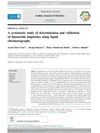 January 2019 in “Arabian Journal of Chemistry”
January 2019 in “Arabian Journal of Chemistry” Method found to accurately identify finasteride impurities using liquid chromatography.
 17 citations,
December 2019 in “Stem Cells International”
17 citations,
December 2019 in “Stem Cells International” Bioactive molecules show promise for improving skin repair and regeneration by overcoming current challenges with further research.





















